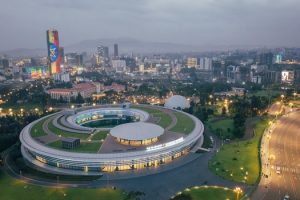
BY DARGIE KAHSAY
Digital services are intensifying in different sectors and government offices to deliver services. With its “Digital Ethiopia-2025” strategy, aiming at leveraging digital opportunities and propelling them into an innovative and knowledge-based economy, Ethiopia is accelerating digitalization in all sectors. Services are becoming digitalized which makes service-provision easily accessible. It as well helps to promote good governance and to monitor activities easily.
Digitalization of services is making public-service delivery sectors to become more transparent as the system manages everything and makes the system easily monitored. The digital technology is also helpful in fighting corruption and other illegal activities in different sectors. It is helpful to ensure good governance and to deliver modern services.
Considering the multifaceted advantages of digitalizing services, recently Ministry of Transport and Logistics announced that fuel stations in Addis Ababa would fully enter in to digital payment system starting from end of April month 2023 which currently is operational under pilot level.
According to the ministry, the digital payment system would help to monitor the services of the fuel satiations and the daily and monthly fuel consumption in the capital. The system was operational since the fuel subsidy system was applied on July 2022 for the subsidy beneficiaries. But, currently the ministry is fully digitalizing the payment system in fuel stations for all customers in Addis Ababa and announced that the payment system will be fully digitalized across the country starting from 01 July 2023.
The payment system is to apply by using the telebirr digital payment platform, a mobile money payment system launched by Ethio Telecom in May 2021 and upgraded to Telebirr Supper App last month. “Until the mid of April, the payment system would be applied on pilot level in Addis Ababa” speaking at the launching event, Minister of Ministry of Transport and Logistics, Alemu Sime (PhD) said adding that “starting from early May 2023, the payment system in fuel stations to buy fuel for any vehicle would be only through telebirr electronics payment system.”
He added that the electronic payment system in fuel stations would fully applied across the country starting from the coming July. To apply the system, Ministry of Transport and Logistics, Ethio Telecom and Petroleum Supply Enterprise have signed memorandum of understanding (MoU) and agreed to work jointly for the proper functioning of the system.
“Digitalizing the fuel payment system in fuel stations will play vital role in controlling wastes and illegal activities in the distribution” Alemu noted. As to him, Ethiopia is investing huge foreign currency to import fuel with high subsidizing capital; Alemu stated adding that due to the subsidy by the government fuel is less expensive in Ethiopia as compared with other neighboring countries. Due to this reason, there is high contraband of fuel and it is important to manage the fuel market by applying technology.
Hence, the minister said, to modernize the service and to manage the illegal activities in the sector, applying electronic payment system in all fuel stations is critical. Alemu added that in the near future transport tariff payment would also be digitalized so as to modernize the service in the transport sector.
Speaking at the event Trade and Regional Integration Minister, Gebremeskel Chala, on his part said that digitalizing fuel market would help the country to manage and to wisely use the fuel that is imported with billions of foreign currency. As to him, the digital payment system would help to control daily fuel consumption and to manage the overall fuel management system in our country. “It would be also helpful for government and private vehicles to avoid resource wastage,” he added.
On her part, Chief Executive Officer (CEO) of Ethio Telecom, Firehiwot Tamiru said during the launching event that digitalizing the fuel payment system through telebirr is part of building digital Ethiopia strategy. “Currently, telebirr customers exceed 30 million” Firehiwot stated adding that “during the last eight months, over 31.8 billion birr was transacted through telebrirr to buy fuel by fuel subsidy beneficiaries.” To make the payment system digital throughout the country, the telebirr platform is ready to be functional across fuel stations.
Director General of Petroleum and Energy Authority, Sahrela Abdulahi said on her part that after the fuel subsidy was made functional; the fuel trading for the subsidy beneficiaries was through telebirr. Now, the whole system of fuel trading is integrated into the modern electronics payment system.
“Annually, Ethiopia is investing over four billion dollars to import fuel” Sahrela said adding that “digitalizing this market is crucial to manage the fuel distribution in stations and the fuel market in every station.” As to her, from 1,450 fuel stations across the country, 1,250 of the stations already have started using telebirr to sell fuel. The remaining stations will also join the system.
Meanwhile, Public Procurement and Property Authority announced that the bid procurement system is becoming digitalized. So far, one thousand bids of public procurement were applied through electronics system, according to the authority.
Speaking to Ethiopian Press Agency, authority’s Electronics Public Procurement System Manager, Tadese Kebede said that to solve good governance problems, malpractice and corruption, it is important to apply electronic system in the public procurement. “To control the malpractice in public procurement across the country, Ethiopia has applied national electronics procurement system” Tadese said adding “so far since the system was launched, one thousand procurement bids applied through the electronic system.”
“Electronics public procurement system was applied in 2022 and since the launching of the system, one thousand procurement bids were publicized using the electronic system. To further modernize the system with the goal of controlling corrupt and malpractice activities in the public procurement and in bid, efforts are underway to develop the system,” the manager said.
According to Tadese, electronics procurement system was introduced in Ethiopia considering in mind ensuring good governance, to provide appropriate services matching to the allocated cost and to support the economic and social development efforts of the country. Though Ethiopia introduced the system lately, he said, Ethiopia is exploiting the late-comer advantage by taking experiences from other countries and the system is growing fast in short period of time.
By further developing and modernizing the electronic procurement system, efforts are underway to make public procurement fully operational using electronic methods. By keeping away from human contact, the effort is to make the sector free from corruption and other misuse activities.
Electronic public procurement would reduce corruption significantly and the system was introduced mainly to tackle corruption, Tadese underlined. The system makes procurements transparent. It helps to manage unnecessary wastes and open an opportunity to traders to compte bid from anywhere. In addition, the system also gives more advantage for the purchasers to find more alternatives through the system.
Recently, the Federal Supreme Court and Ethio Telecom also signed memorandum of understanding to apply E-court service with the goal of supporting federal courts service with technology, to make the service easily accessible for citizens and to provide quick justice for citizens’ demands.
According to the office of the Supreme Court, providing services through technology would help to solve citizens’ complaints and to satisfy citizens regarding finding justice timely. The digital system, according to court, would integrate the courts and first instance courts and to ease information exchange.
THE ETHIOPIAN HERALD FRIDAY 21 APRIL 2023




